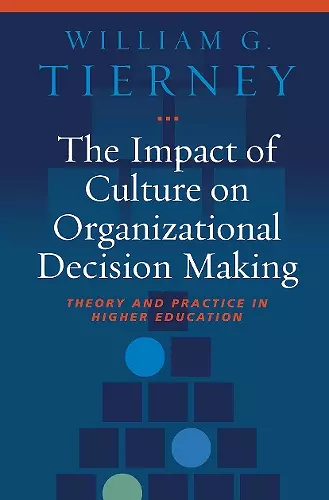The Impact of Culture on Organizational Decision-Making
Theory and Practice in Higher Education
Format:Paperback
Publisher:Taylor & Francis Inc
Published:19th Sep '08
Currently unavailable, and unfortunately no date known when it will be back

Colleges and universities are currently undergoing the most significant challenges they have faced since World War II. Rising costs, increased competition from for-profit providers, the impact of technology, and the changing desires and needs of consumers have combined to create a dynamic tension for those who work in, and study, postsecondary education. What worked yesterday is unlikely to work tomorrow. The status quo or bromides such as “stay the course” are insufficient responses in a market that demands creativity and innovation if an organization does not simply wish to survive, but thrive.Managerial responses or top-down linear decisions are antithetical to academic organizations and most likely recipes for disaster. In today’s “flat world”, decision-making for most organizations has become less hierarchical and more decentralized. Understanding this trend is of particular importance for organizations with traditions of shared governance. The message of this book is that understanding organizational culture is critical for those who recognize that academe must change, but are unsure how to make that change happen. Even the most seasoned college and university administrators and professors often ask themselves, “What holds this place together?” The author’s answer is that an organization’s culture is the glue of academic life. Paradoxically, this “glue” does not make things get stuck, but unstuck. An understanding of culture enables an organization’s participants to interpret the institution to themselves and others, and in consequence, to propel the institution forward.An organization’s culture is reflected in what is done, how it is done, and who is involved in doing it. It concerns decisions, actions, and communication on an instrumental and symbolic level. This book considers various facets of academic culture, discusses how to study it, how to analyze it, and how to improve it in order to move colleges and universities aggressively into the future while maintaining core academic values. This book presents updated versions of eight key articles on organizational culture in higher education by William G. Tierney. The new introduction that sets them in the context of current and future challenges will add further value to articles that are already in high demand.
“At a time when institutions recognize the need for change but may be unsure of how to make that change happen, I found The Impact of Culture on Organizational Decision Making, by William G. Tierney (Stylus Publishing, 2008), a must-read. I would recommend it to business officers and other leaders engaging their campuses in improvement and prioritization processes. Understanding the culture of the institution—and of higher education in general—is vital to the success of any change plan, particularly for business officers coming from private industry. Tierney’s call to look beyond the structure of American research institutions and use a cultural model to understand organizational decision making is a needed wake-up call to college and university administrators who wish to lead their organizations to success and excellence in the 21st century.”
Business Officer Magazine
"Overall, this collection enables a fresh look at a set of theoretically rich articles, all of which have maintained their currency in how we might think about and study postsecondary organizations. And while the chapters may not present any easy answers to those who work within higher education, the clear prose and cogent explanations certainly clarify how one's theory of organizational culture matters."
Rebecca D. Cox, Ph.D.
Journal of College Student Retention
"Tierney's book offers an enlightening review of the culture of higher education. It provided me with the opportunity to reexamine our collective assumptions regarding student engagement and retention. Tierney's analysis of Tinto's work offers a gateway to the next level of deeper understanding for college administrators who want to move beyond simply retaining students and to a level of student growth, institutional enhancement, and professional excellence. Tierney's call to look beyond the structures of large American research institutions and utilize a cultural model to understand organizational decision making should be a wake-up call to college and university administrators who wish to lead their organizations to success and excellence in the 21st century."
Jim Mello, Assistant Provost for Financial Planning, University of Hartford
ISBN: 9781579222871
Dimensions: unknown
Weight: 240g
190 pages